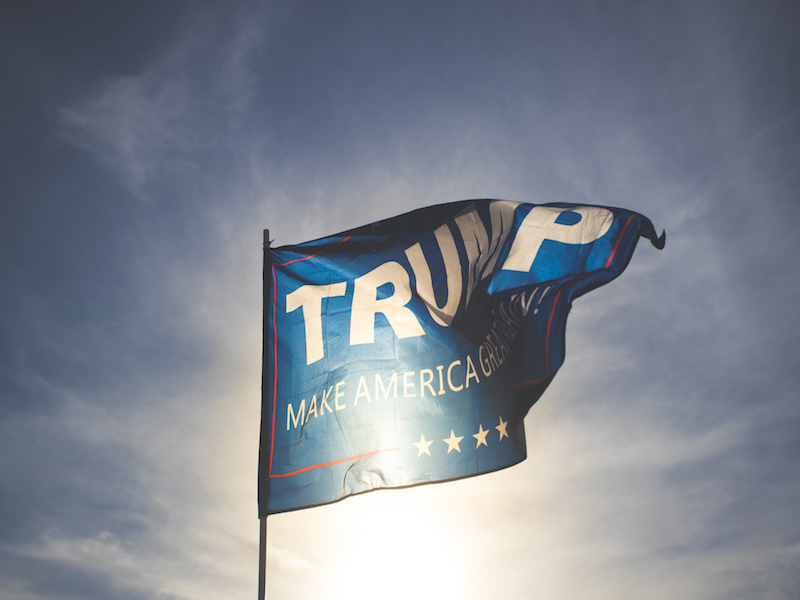

With the Trump administration continuing to take aim at its major trading partners, institutional money managers are warning investors to anticipate more volatility in equity markets.
“A full-blown trade war would be a major reversal of the trend toward globalization that has underpinned markets for decades and could have severe consequences for corporate profits, given the importance of global supply chains to manufacturers, a major component of market indices,” wrote Paul Quinsee, global head of equities at JP Morgan Asset Management, in the firm’s latest global equity view.
“To be sure, it is difficult for any investor to price the risk of a breakdown in trade, and the impact would vary tremendously by company, so we need to pay close attention.”
Indeed, it’s been a week with plenty of action. While China made it clear in April it intends to target American farmers in its retaliatory tariffs, President Donald Trump announced a $12-billion plan on Tuesday to aid farms affected by the tariffs.
On Wednesday, he took a friendlier tone with the European Union after a meeting at the White House with Jean-Clause Juncker, president of the European Commission. Trump promised to stay further tariffs on European goods as negotiations are ongoing, while the E.U. said it would import more of America’s liquid natural gas and soybeans.
As such, this week marks a shift in the terrain on which the U.S. administration is fighting its trade skirmishes. Europe, for now, appears to be out of the hot seat as the meeting significantly deescalated trade tension, according to Dec Mullarkey, managing director of investment strategy at Sun Life Investment Management, in an email to Benefits Canada.
“There was no direct mention of autos but both sides agreed that no new tariffs would be levied while negotiations were ongoing. They also agreed to resolve existing steel and aluminum tariffs,” Mullarkey noted.
The E.U.’s promise to take on more American soybeans is a key win for Trump as he’s directly acknowledged how Chinese tariffs on this product and other commodities are affecting U.S. farmers, he said.
“While the next steps remain vague, markets will take comfort from the shift in tone from protectionism to finding solutions though mutually beneficial trade,” added Mullarkey.
Both European and U.S. markets saw a boost following the meeting, pointed out Mullarkey, referring to the Nasdaq’s historical high on Wednesday. Trump’s tone with the E.U. could be promising as the North American Free Trade Agreement negotiations are set to ramp up again. But China may not be so lucky, as the Trump administration is taking exception to more complex issues that relate to intellectual property rights, he said.
The country appears to be fighting back on a less macro level, letting the approval date for what would have been the biggest deal in semiconductor history slip by, reported Bloomberg. Qualcomm Inc. was set to acquire NXP Semiconductors for US$44 billion, a deal that required China’s approval. Rather than rejecting the deal, the Chinese government failed to actively approve it.
Some analysts previously predicted that such moves to disrupt American businesses were on the way, noting China would have to be more creative in its retaliation as it can’t directly counter tariff for tariff because it imports fewer American goods, Mullarkey told Benefits Canada earlier this month.
All these agressions, passive or otherwise, have been accompanied by the beginnings of a de-synchronization in the global growth that had been lifting markets worldwide last year, said Stephen Lingard, senior vice-president and portfolio manager at Franklin Templeton Multi-Asset Solutions, in the firm’s assessment of what’s expected in 2018’s third quarter.
As well, China, Japan and Europe have all seen a slowdown, which is cause for concern, especially among investors with more significant weightings in emerging markets, he said.
Headline concern is indeed pushing negative sentiment in the marketplace, noted Lingard, which is driving lower valuations and signalling the beginning of a market pullback. “Protectionism like this is a real wild card for markets and it could be challenging if an escalation continues,” he said.
China’s growth is also slowing for internal reasons, noted Lingard, as the country is shifting its focus from faster quantitative growth to a more qualitative style, which is reducing its credit in the global economy.
